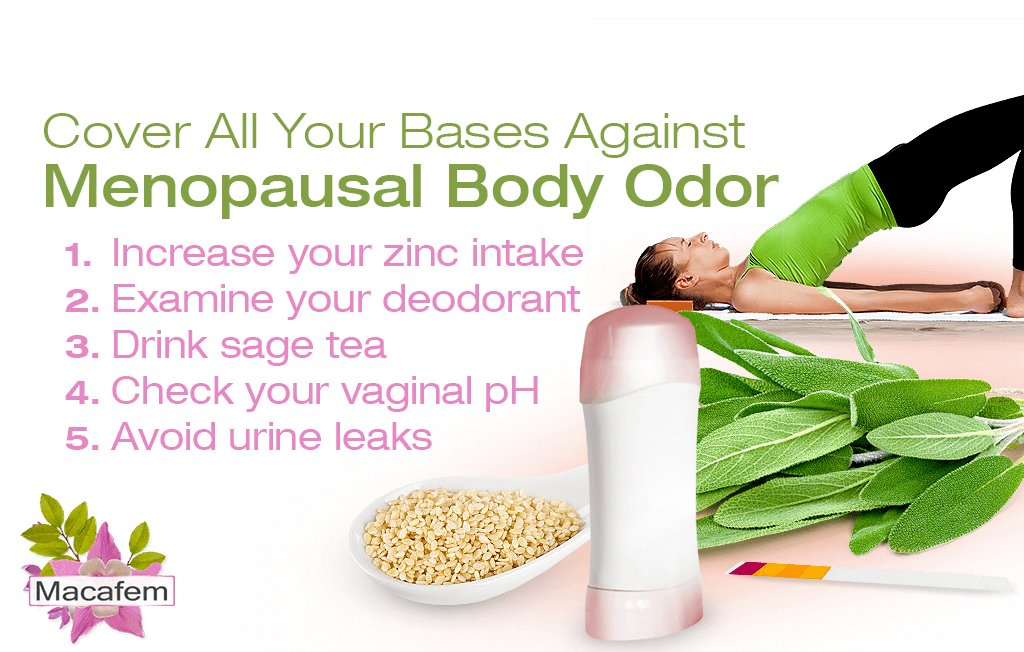Cover All Your Bases Against Menopausal Body Odor
Body odor during menopause is not just embarrassing, but it’s also complex: the root cause may be, essentially, hormonal, but the domino effect of estrogen and progesterone fluctuations can affect your personal scent in many ways. The powerful combination of Macafem and minor lifestyle tweaks may be already helping you restore your endocrine health, but in the meantime, it’s important to check all the possible sources of accidental offense.
If you’re looking to eliminate menopausal body odor for good, consider these five factors:

1. Lack of Zinc
Zinc is an essential mineral in the human diet, and therefore, a deficiency can cause many unwanted side effects, from acne breakouts to heightened body odor. It’s a good idea to review your diet to ensure you are getting enough of this valuable nutrient. Fortunately, increasing your zinc intake may be as easy as adding some extra sesame or pumpkin seeds on top of your salad every day or indulging in occasional seafood.
2. Examine Your Deodorant
When it comes to personal hygiene products, sometimes you get what you pay for – but a fancy label is not necessarily the best option against body odor. Take some time to read your deodorant or antiperspirant’s label carefully: many of the added “fresh scents” may accidentally be making the problem worse, since they may not mix well with you natural scent.
Also, consider the active ingredient’s concentration in your preferred brand: what makes antiperspirants effective is aluminum clorohydrate, which, despite the bad rap it has (inaccurately) received lately, has been shown by countless studies to be safe in concentrations of up to 25%. Nonetheless, different antiperspirant brands have varying amounts of it, to the point that in some cases it may not be effective enough for you.
3. Prevent Hot Flash Sweat with Sage
Sage (Salvia officinalis) is mostly known for its ability to enhance the flavor of pork and chicken, but it also hides a few medicinal abilities. This scented leaf has been used since the times of Ancient Greece as a remedy for hyperhidrosis, or excessive sweat, and even now, sage tea is commonly touted as a good way to prevent hot flashes. While hot flashes will ultimately go away after your hormone levels become balanced, it’s a good idea to make them as mild as possible in the meantime, since the sweat downpour they produce is a common trigger for offensive odor.
4. Check Your Vaginal pH
Another common side effect of menopause, vaginal dryness, can also be indirectly impacting your body odor. As lack of natural lubrication can throw off your vaginal pH, it can make you more sensitive to passing bacterial or fungal infections – especially mild, but chronic, subclinical yeast infections. These are not likely to cause many of the most noticeable symptoms of yeast infections (white discharge, severe itching), but may still be creating enough “fishiness” to be noticeable to those around you. Talk to your OB/GYN about it at your next checkup.
5. Avoid Urine Leaks
Unfortunately, vaginal dryness is not the only other symptom of menopause that can worsen your body odor. It is common for women to experience mild “stress incontinence” – that is, small leaks of urine after exercise, laughing, or coughing – as a result of dwindling hormones. It may be that just a few, barely-noticeable drops of urine are also influencing your scent – in this case, it will probably have an ammonia-like result. Kegel exercises can be of great help here, as they can both fix mild incontinence and prevent it in the future.
Once you’ve accounted for all these factors, it’ll be easy to halt body odor and go back to feeling squeaky clean throughout the day. Meanwhile, learn more about adopting a healthier lifestyle during menopause, or read about women who have experienced the benefits of Macafem firsthand on our Testimonials page.
National Institutes of Health. (2012). Aging changes in the female reproductive system. Retrieved April 9, 2015, from http://www.nlm.nih.gov/medlineplus/ency/article/004016.htm
National Institutes of Health. (2014). Zinc. Retrieved April 9, 2015, from http://www.nlm.nih.gov/medlineplus/druginfo/natural/982.html#Dosage
Waetjen, L., Ye, J., Johnson, W., et al. (2009). Association between Menopausal Transition Stages and Developing Urinary Incontinence. Obstetrics and gynecology, 114(5), 989-98. Retrieved from http://www.ncbi.nlm.nih.gov/pmc/articles/PMC3120214/

